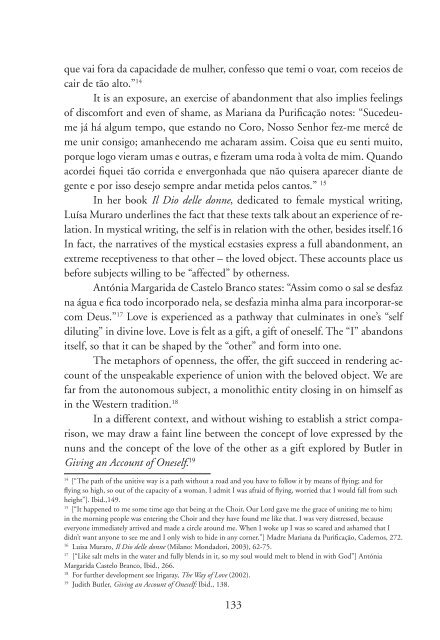Teaching Subjectivity. Travelling Selves for Feminist ... - MailChimp
Teaching Subjectivity. Travelling Selves for Feminist ... - MailChimp
Teaching Subjectivity. Travelling Selves for Feminist ... - MailChimp
Create successful ePaper yourself
Turn your PDF publications into a flip-book with our unique Google optimized e-Paper software.
que vai <strong>for</strong>a da capacidade de mulher, confesso que temi o voar, com receios de<br />
cair de tão alto.” 14<br />
It is an exposure, an exercise of abandonment that also implies feelings<br />
of discom<strong>for</strong>t and even of shame, as Mariana da Purificação notes: “Sucedeume<br />
já há algum tempo, que estando no Coro, Nosso Senhor fez-me mercê de<br />
me unir consigo; amanhecendo me acharam assim. Coisa que eu senti muito,<br />
porque logo vieram umas e outras, e fizeram uma roda à volta de mim. Quando<br />
acordei fiquei tão corrida e envergonhada que não quisera aparecer diante de<br />
gente e por isso desejo sempre andar metida pelos cantos.” 15<br />
In her book Il Dio delle donne, dedicated to female mystical writing,<br />
Luísa Muraro underlines the fact that these texts talk about an experience of relation.<br />
In mystical writing, the self is in relation with the other, besides itself.16<br />
In fact, the narratives of the mystical ecstasies express a full abandonment, an<br />
extreme receptiveness to that other – the loved object. These accounts place us<br />
be<strong>for</strong>e subjects willing to be “affected” by otherness.<br />
Antónia Margarida de Castelo Branco states: “Assim como o sal se desfaz<br />
na água e fica todo incorporado nela, se desfazia minha alma para incorporar-se<br />
com Deus.” 17 Love is experienced as a pathway that culminates in one’s “self<br />
diluting” in divine love. Love is felt as a gift, a gift of oneself. The “I” abandons<br />
itself, so that it can be shaped by the “other” and <strong>for</strong>m into one.<br />
The metaphors of openness, the offer, the gift succeed in rendering account<br />
of the unspeakable experience of union with the beloved object. We are<br />
far from the autonomous subject, a monolithic entity closing in on himself as<br />
in the Western tradition. 18<br />
In a different context, and without wishing to establish a strict comparison,<br />
we may draw a faint line between the concept of love expressed by the<br />
nuns and the concept of the love of the other as a gift explored by Butler in<br />
Giving an Account of Oneself. 19<br />
14<br />
[“The path of the unitive way is a path without a road and you have to follow it by means of flying; and <strong>for</strong><br />
flying so high, so out of the capacity of a woman, I admit I was afraid of flying, worried that I would fall from such<br />
height”]. Ibid.,149.<br />
15<br />
[“It happened to me some time ago that being at the Choir, Our Lord gave me the grace of uniting me to him;<br />
in the morning people was entering the Choir and they have found me like that. I was very distressed, because<br />
everyone immediately arrived and made a circle around me. When I woke up I was so scared and ashamed that I<br />
didn’t want anyone to see me and I only wish to hide in any corner.”] Madre Mariana da Purificação, Cadernos, 272.<br />
16<br />
Luisa Muraro, Il Dio delle donne (Milano: Mondadori, 2003), 62-75.<br />
17<br />
[“Like salt melts in the water and fully blends in it, so my soul would melt to blend in with God”] Antónia<br />
Margarida Castelo Branco, Ibid., 266.<br />
18<br />
For further development see Irigaray, The Way of Love (2002).<br />
19<br />
Judith Butler, Giving an Account of Oneself: Ibid., 138.<br />
133

















